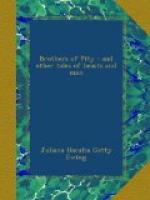“Once upon a time—it was the village fair week, when, as you know, every one eats and drinks as much as he possibly can, and consequently a great many animals are killed,—the farmer’s cook came into the fowlyard, and after carefully looking over all the chickens, remarked that seven of them would be twisting merrily on the spit next morning. On hearing this, all the fowls were plunged into the deepest despair, for no one felt sure that he would not be of the seven, and no one could guess how the victims would be chosen. Two young cockerels, in their deep perplexity, at last went to the yard-dog, Flaps by name, who was a very great friend of theirs, and to him they cackled out their woes.
“‘Why do you stop here?’ asked Flaps. ’If you had any pluck at all you would run away.’
“‘Ah! Perhaps so—but who has enough courage for such a desperate step?’ sighed the young cockerels. ’Why, you yourself are no more courageous than we, else why do you stop here chained up all day, and allow those tiresome children to come and tease you?’
“‘Well,’ replied the dog, ’I earn a good livelihood by putting up with these small discomforts, and besides that, I am not going to be set twisting on a spit. However, if you particularly wish it, we can go away somewhere together; but if we do, I may as well tell you at once, that you will have to feed me.’
“The cockerels, fired by this bold advice, betook themselves at once to the henroost with the courage of young lions; and after a short but animated discussion, persuaded the whole of the cocks and hens to run away and to take Flaps as protector of the community.
“When darkness fell, the dog was unchained for the night as usual, and as soon as the coast seemed clear, he went to the henhouse, pushed back the sliding door with his nose, and let them all out.
“Then he and the whole company stole away as quietly as possible through the yard-gate, away out into the open country.
“The fowls flew and wandered on, the livelong night, perfectly happy in their freedom, and feeding themselves from the sheaves of corn that stood in the stubble-fields.
“Whenever Flaps felt hungry, the hens laid him a couple of eggs or so which he found far nicer than barley-meal and dog-biscuit.
“When they passed through thinly-populated places where they were not likely to be observed, they marched gaily forward; but whenever there was a chance of danger, they only travelled by night.
“Meanwhile the cook went early in the morning to kill the chickens; but on finding the whole place as empty as Mother Hubbard’s cupboard, she fell into a violent fit of hysterics, and the kitchen-maid and pig-boy had to put her under the pump, and work it hard for a quarter of an hour before they could revive her.
“After some days’ journeying, the wanderers arrived at a large desolate-looking heath, in the middle of which stood an old weather-beaten house, apparently uninhabited. Flaps was sent forward to examine it, and he searched from garret to cellar without finding a trace of a human being. The fowls then examined the neighbourhood for two whole days and nights with a like result, and so they determined to take up their abode in the dwelling.




